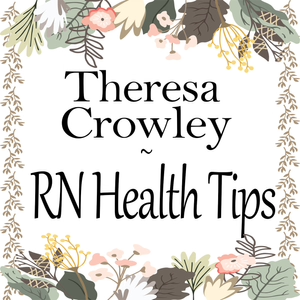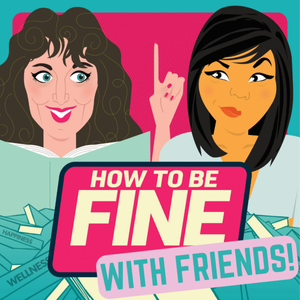
Ep 17: Mental Health Counseling: Dealing with Vicarious Trauma & Postpartum Depression with Dr. Anjabeen Ashraf
01/13/20 • 36 min
- What is ‘vicarious trauma’?
- What Dr. Anjabeens research study reveals about vicarious trauma
- Honoring your mental health
- Healing through community
- Coping with your stress and trauma through ‘grounding’
- What to do when you have symptoms of postpartum depression
- Boundary work and why it matters
- Setting boundaries in the workplace
- Dr. Anjabeen’s social justice work on the hate crime law implementation committee in Oregon
- Dr. Anjabeen’s advice to young Muslim women who are thinking of a career in counseling, psychotherapy, mental health, and psychology
Where to reach Dr. Anjabeen Ashraf:
Dr. Anjabeen Ashraf Bio:
Dr. Anjabeen Ashraf holds a doctorate in Counselor Education and a Master’s degree in Counseling. Her work has focused on vicarious trauma in American Muslims, mental health counseling, and anti-oppression work.
She has presented on a number of topics including working with Muslim clients, social justice issues, mental health issues, and courtship/marriage.
Dr. Ashraf is currently serving on the Hate Crime law implementation committee in Oregon. This groundbreaking legislation passed in Oregon in 2019 and amends the criminality of hate crimes and expands the state’s tracking of hate crimes and hate incidents. Dr. Ashraf’s work on the steering committee focuses on trauma-informed practices and support for survivors of hate crimes.
Dr. Ashraf firmly believes in the power of counseling and personal growth work. Her online presence is focused on destigmatizing mental health and wellness in South Asian and Muslim communities. Engaging with the public outside the siloes of academia is important in Dr. Ashraf’s anti-oppression framework.
Want to hear more stories from amazing Muslim Women?
Please subscribe on Apple Podcast, Stitcher or on your favorite podcast platform. Get notified so you never miss out!
Let us know what you think and what part of the podcast conversation you enjoyed the most by leaving us a review and rating here! And don’t forget to join us on our Facebook group Professional Muslim Women to continue the conversation and connect with a community of Muslim women like you!
Resources:
- What is ‘vicarious trauma’?
- What Dr. Anjabeens research study reveals about vicarious trauma
- Honoring your mental health
- Healing through community
- Coping with your stress and trauma through ‘grounding’
- What to do when you have symptoms of postpartum depression
- Boundary work and why it matters
- Setting boundaries in the workplace
- Dr. Anjabeen’s social justice work on the hate crime law implementation committee in Oregon
- Dr. Anjabeen’s advice to young Muslim women who are thinking of a career in counseling, psychotherapy, mental health, and psychology
Where to reach Dr. Anjabeen Ashraf:
Dr. Anjabeen Ashraf Bio:
Dr. Anjabeen Ashraf holds a doctorate in Counselor Education and a Master’s degree in Counseling. Her work has focused on vicarious trauma in American Muslims, mental health counseling, and anti-oppression work.
She has presented on a number of topics including working with Muslim clients, social justice issues, mental health issues, and courtship/marriage.
Dr. Ashraf is currently serving on the Hate Crime law implementation committee in Oregon. This groundbreaking legislation passed in Oregon in 2019 and amends the criminality of hate crimes and expands the state’s tracking of hate crimes and hate incidents. Dr. Ashraf’s work on the steering committee focuses on trauma-informed practices and support for survivors of hate crimes.
Dr. Ashraf firmly believes in the power of counseling and personal growth work. Her online presence is focused on destigmatizing mental health and wellness in South Asian and Muslim communities. Engaging with the public outside the siloes of academia is important in Dr. Ashraf’s anti-oppression framework.
Want to hear more stories from amazing Muslim Women?
Please subscribe on Apple Podcast, Stitcher or on your favorite podcast platform. Get notified so you never miss out!
Let us know what you think and what part of the podcast conversation you enjoyed the most by leaving us a review and rating here! And don’t forget to join us on our Facebook group Professional Muslim Women to continue the conversation and connect with a community of Muslim women like you!
Resources:
Previous Episode

Ep 16: Fostering Your Child’s Self-Confidence through Literature with Rahma Mohamed
"For the little girl that didn't know a word of English or French, then to graduate in University with both official languages, I felt victorious." -Rahma Mohamed
Literature has always been a passion of Rahma's. Having to forego pursuing her college studies in literature to satisfy her immigrant parents' need for security in choosing a career, Rahma found her way back to her passion unexpectedly. Having never read a children's book herself, Rahma became fascinated with the value and legacy in nurturing and sharing this childhood experience with her own children. As she tried to create this experience with her children, she realized the scarcity of diversity and representation in children's literature. Because of the lack of diversity in the market for Muslim Children’s Book, she decided to self-publish children’s books to encourage kids to be proud of their uniqueness, spread awareness, and celebrate diversity.
Join us in this episode as we talk about diversity in literature, storybooks and parenting with Rahma Mohamed, a children’s storybook author. In this Episode, We Talk About:
- Rahma’s early school and career experience
- What made Rahma walk the path of being a Children’s Storybook Author
- What it feels like to be the only child of color in your class
- How to raise your child so that they have self-confidence within themselves
- Why literature representation for people of color is important
- The role of diversity in literature
Where to reach Rahma Mohamed:
Rahma Mohamed's Bio:
Rahma Mohamed was born and raised in Hargeisa, Somalia. At the age of eight, her family immigrated to Quebec, Canada where she attended her first formal school in French. She mastered both French and English and became the first to graduate from University in her family.
She didn’t learn to read until she was at the age of ten. When she learned to read, a new world opened up to her. And she read all kinds of stories. But sadly, she never found herself in any of them.
Once she became a mother, she set out to self-publish children’s books to encourage youth to be proud of their uniqueness by celebrating diversity.
Fueled by her struggles and life experience, she became determined to offer books centered on characters that are Muslim and with African roots.
She firmly believes that children need to be able to identify themselves in the book they read to enhance their self-confidence as well as bolster their sense of pride. She writes under the pen name Rahma Rodaah which is her first name and middle name combined.
Mentioned from this episode:
- Muhiima’s Quest by Rahma
- Little Brother for Sale by Rahma
- Pebbles that Build Mountains by Rahma Mohamed | TEDx
Want to hear more stories from amazing Muslim Women?
Please subscribe on Apple Podcast, Stitcher or on your favorite podcast platform. Get notified so you never miss out!
Let us know what you think and what part of the podcast conversation you enjoyed the most by leaving us a review and rating here! And don’t forget to join us on our Facebook group Professional Muslim Women to continue the conversation and connect with a community of Muslim women like you!
Next Episode

Ep 18: Pregnancy and Breastfeeding in the Workplace
It’s never easy being a mom and having a full-time job. Balancing work and home is always a very challenging feat but is it really impossible to become successful at both? Recently, the Harvard Business Review published an article that talks about women, being an ideal worker or a perfect mom. The article was demeaning as it deems that women have to choose between motherhood and career if they want to excel and meet society’s high standards. Join us in this episode as we break that narrative that society continues to throw at us. We will also tackle the issue of pregnancy and breastfeeding in the workplace as well as debate on why the article written by Harvard is wrong in many ways.
In this Episode, We Talk About:
- Pregnancy and breastfeeding in the workplace
- Why there is nobody who’s an ideal worker and a perfect parent
- Filtering out people who aren’t good candidates for you to work for or work with
- How to advocate for yourself
Want to hear more stories from amazing Muslim Women?
Please subscribe on Apple Podcast, Stitcher or on your favorite podcast platform. Get notified so you never miss out!
Let us know what you think and what part of the podcast conversation you enjoyed the most by leaving us a review and rating here! And don’t forget to join us on our Facebook group Professional Muslim Women to continue the conversation and connect with a community of Muslim women like you!
Resources:
If you like this episode you’ll love
Episode Comments
Generate a badge
Get a badge for your website that links back to this episode
<a href="https://goodpods.com/podcasts/defiance-academy-92665/ep-17-mental-health-counseling-dealing-with-vicarious-trauma-and-postp-4989249"> <img src="https://storage.googleapis.com/goodpods-images-bucket/badges/generic-badge-1.svg" alt="listen to ep 17: mental health counseling: dealing with vicarious trauma & postpartum depression with dr. anjabeen ashraf on goodpods" style="width: 225px" /> </a>
Copy




